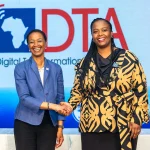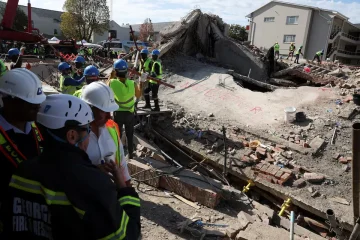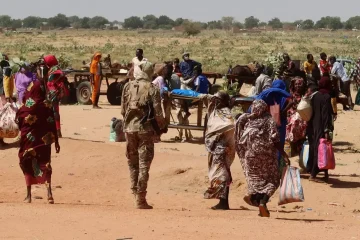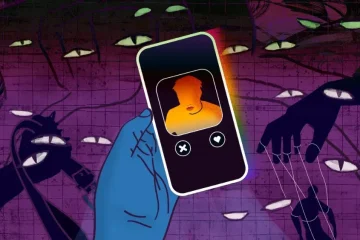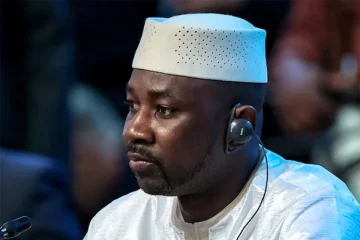NJODZEKA DANHATU
EACH morning when 18-year-old Awa Bless Chi steps outside his family’s home in Douala, Cameroon, crowds of youngsters gather around, curious to see what new invention he’s come up with overnight.
Chi is the de-facto “tech guru” of the community – but it isn’t this way by design. His foray into the tech world was accidental and emerged from a burning desire for toys.
In 2007, when he was about 4, Chi’s parents couldn’t afford to buy him a toy he really wanted, So, at that young age, he decided to build one for himself. Then, he built a few more.
“It is just from the experience through toys that children were playing around with. I also liked to play but I had no means… that is why I started seeing how I could construct mine,” he explained.
A native of Cameroon’s northwest region of Pinyin, Chi is among the thousands that fled violence in 2017 when a separatist war broke out in the English-speaking region of the country.
In Douala, Chi found himself without regular schooling so he turned his hobby into a full-time occupation while waiting to continue his education. Before long he had established a remarkable reputation – and a regular crowd.
Now a high school student at the technical college in Douala, Chi hopes to go to university to further his study in engineering.
He also spends time teaching other youngsters to make their own miniature machines and hopes they’ll become part of his big ambition… to design and build affordable, heavy-duty machines for the continent.
To that end, he is already assembling a team, thanks to the network that he has created through his toys. Though now, the designs are for more ambitious projects and the team meets online.
“I discover that for our country to develop, it needs more people with the skills because one person cannot work alone. So, you need a team of people with such ideas in their heads to facilitate the development. I started seeing how I could train some people with the skills who can reason some other things out and also join me to facilitate the research,” he explained.
He points out that Cameroon and African countries spend billions of dollars to import heavy earth machinery from China, Japan and Western countries… machines that he believes could be produced on the continent.
“I have a caterpillar which I constructed with iron and I know how it operates from the beginning to the end. I have studied how to use other materials to construct the heavy-duty machines – aircraft and others – but I don’t have the physical materials to manufacture real ones,” explained Chi.
“It is just now I have started to use irons because I have some tools which can trim iron now to construct the heavy-duty machines.”
The limit on physical commodities is likely to only be a temporary hindrance to this teen’s dreams, however. He has already created a tech company called Chi Styles and is investing every penny he can – much of that comes from donations from fans. Nevertheless, he hankers after a more facilitating environment.
“Each time I change a stage, it causes me to upgrade too. But now I am facing difficulties because I don’t have some good machines, a good environment, a good laboratory that has been equipped and a lot of data to do research. All these is limiting my updating of what I am doing.”
Chi is also involved in artificial intelligence work and is developing a robot in his workshop.
“I am building a robot because to have a real company which cannot manufacture this stuff in reality, you need some robots to assemble in the factory that will manufacture some difficult parts which cannot be produced with the hand. If you don’t have robots, you cannot work, like, one hundred to two hundred caterpillars a day,” he said.
He is now studying mechatronics, defined as “the combination of robotics, electronics, computer science, telecommunications, systems, control and product engineering”.
Already some of Chis’ mentees like Vidiol Tsangue are making names for themselves, he explained. Tsangue is from the town of Bamenda, capital of Cameroon’s Northwest region. He had difficulty in 2019 completing a prototype plane project, but Chi helped him solve it and even fly it.
Tsangue has become well known in Bamenda for his tech skills. In 2019, after flying his prototype, he received a special audience with Cameroon’s Prime Minister, Joseph Dion Ngute, who acknowledged his efforts.
Another mentee riding high on Chi’s teaching is Mofor Stanisloss Mbakoh, a classmate. According to Mbakoh, meeting Chi allowed him to transform his dreams of designing actual machines, into reality.
“When we started it was a kind of difficult, but it is easy to do it now. I can now sit in the house and do my own thing by myself just from the instructions I get from him,” said Mbakoh.
When the COVID-19 Pandemic intensified in Cameroon, Chi and Mbakoh created an electronic trashcan. This trashcan limits contact with people. It opens when you stand in front of it and it closes when you leave, thus allowing litter to be deposited without touching it. Once the trash can is full, it transfers trash into a larger bucket behind it without any human interaction.
“Africa is the future and we are part of it, we are here to conquer,” Chi says. The phrase has become his mantra.



